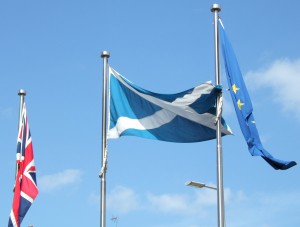The Scottish Independence Poll Dance
The campaign for an independent Scotland has become something of a poll dance.
It’s been a week since a mysterious pollster named Kelly Brown leaked news that Westminster allegedly covered up results of a survey because it showed a surge in support for the Yes campaign. Ipsos MORI, which conducted the survey, denied employing anyone by that name (at least, not anymore, it would seem), but the allegation still spawned a predictable barrage of accusations from both campaigns. For the Yes camp, Alex Salmond and SNP MP Angus MacNeil lambasted the Tory-Lib Dem coalition for a lack of transparency and spending nearly £50,000 for partisan research, while #publishthepoll trended on Twitter (so now it’s an official “issue”). Union backers, for their part, pointed out that internal research isn’t ever disclosed, but if you really must ask, this particular survey didn’t reveal anything different than other recent polls.
It is perhaps precisely because of “other recent polls” that the Yes campaign was so eager for a bump in support to be published. An ICM poll this week showed No support gaining nine points over last month, now clocking in at 46%, significantly higher than Yes’s 34%. Panelbase also found a boost for the union—though it was a tepid two-point bump—moving the split to 47%-40% with four months to go.
The widening gap seems to deaden gains made by the Yes camp since the New Year, given that a month ago Scotland on Sunday’s ICM numbers pegged them trailing only 39% to 42%—a spread commonly within the plus-minus margin of error. But faced with these mercurial, temperamental polls, it’s becoming more and more rewarding to follow issues (gasp) over survey data to get a read on the campaign.
The SNP is being questioned over its commitment to tackling income inequality (read David Torrance’s piece in the Herald on the legislative “levers” the Scottish government have perpetually overlooked on this issue). Is a full-fledged Scottish social democracy of universal benefits merely waiting for Westminster to butt out before emerging? Or was the ideal of Scottish egalitarianism a myth created as devolution took hold? Either way, to see the Nats tackle the underpinnings of class inequality would make early 20th century union-aligned Labourites scratch their heads.
European Commissioner for Enlargement, Stefan Fule, added to the Yes woes this week with news that an independent Scotland would lose the UK’s opt-out of VAT on many consumer items. New members face a 15% VAT, which the Tories were quick to point out would raise the price of a Guinness Book of World Records by £3, God forbid. Cue SNP rebuttal: according to Tasmina Ahmed-Sheikh, SNP candidate for European Parliament, Scotland wouldn’t be an accession state, and would argue “from within” to keep their opt-out authority. Lump that one in with the other thousand unknowns regarding an independent Scotland in the EU.
Okay, so an issue-based analysis of the past week doesn’t bear much fruit for Yes, either. (Did I mention a group of 14 biomedical researchers also expressed concern about academic funding, should a border be placed along the Tweed?) But the SNP is still steadfastly courting the youth vote, and has continued to woo undecided voters with a positive enthusiasm mostly unmatched by Better Together. Broader-scale advantages still reside in the Yes arsenal too: First, according to a University of Stirling study published earlier this month, independence supporters are more committed to voting than their union counterparts, meaning election turnout should be considered in pre-referendum speculation. Second, a late summer surge of nationalist fervor can’t be undervalued, given Glasgow’s hosting of the Commonwealth Games, and the 700th anniversary of the Bannockburn.
There you have it—a week of poll-whistleblowers, financial warnings from the Continent, and questions of commitment to social democracy. If the deluge of attacks on the independence campaign tells us anything, it’s that Better Together is not resting on its laurels. And if the oscillating poll numbers since the New Year tell us anything, it’s that a lot can happen in four months.
Submitted by Noah Caldwell
